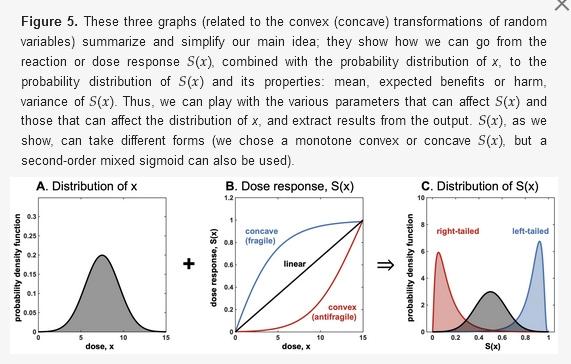Those who know of the generational genius thinker, Nassim Taleb, should already be familiar with his concept of Antifragility, based on the notion of convex tinkering. And those who are aware of the concept of Adaptive Theory (as applied to human cancer) should also be well- acquainted with the pioneering work being done by the Integrated Mathematical Oncology Department at the Moffitt cancer Center in Tampa, FL. The following paper was done jointly by Taleb and Moffitt's Jeffrey West:
Working with Convex Responses: Antifragility from Finance to Oncology, by Nassim Nicholas Taleb and Jeffrey West, Entropy 2023, 25(2), 343, Submission received: 26 September 2022 / Revised: 23 January 2023 / Accepted: 25 January 2023 / Published: 13 February 2023.
This closing excerpt from the paper summarizes the current treatment dilemma all patients with advanced/metastatic disease eventually face - and highlights the special debt we owe to those who continue to openly share their n=1 non-SOC protocols with our community:
* * *
There is active literature on “overdiagnosis”, see Kalager et al. (2012) [39] and Morell et al. (2012) [40]. The point is that treating a tumor that does not kill reduces life expectancy; hence the need to balance iatrogenics and risk of cancer. An application of nonlinearity can shed some light on the approach and clarify the public debate [1].
In a similar spirit of avoiding over-treatment, adaptive therapy in metastatic castrate-resistant prostate cancer (clinical trial NCT02415621) has illustrated the feasibility of irregular treatment protocols based on algorithms that react to tumor response. Adaptive treatment protocols maintain a stable population of sensitive cells in order to suppress the emergence of resistance [41,42]. Resistance, in some cases, is similar to the irreconcilable ruin of a financial “blowup” as patients may develop multi-drug resistance to structurally or functionally different drugs. The irreversibility of such clinical outcomes is similar to that of financial ruin, a tail fragility situation from which the agent cannot exit. Adaptive algorithms decrease the cumulative dose administered to a patient, lessening the selection for resistance [43]. While it is not an explicitly stated goal of adaptive therapy, these schedules increase both intra- and inter-patient dosing variance [44].
Last year (2022) saw the publication of calls from within the FDA to revamp the dose-finding protocols to be suitable for targeted therapies [45]. Traditional dose selection protocols invented for use with cytotoxic chemotherapies may not apply to targeted therapies that have exposure–response curves which plateau at low toxicities to the patient. Differences in convexity between chemotherapies and newly developed targeted therapies lead to differing outcomes in diminished returns of dose escalation and differing curvature of dose–response curves.
* * *
Here is a link to a short description about the paper by Jeffrey West in the online "LabPages" at the Evolutionary Dynamics, Interactions & Therapy Lab in the Integrated Mathematical Oncology Department with links to other resources there:
Antifragility & convexity in dose response, Written by Jeffrey West on 01 Sep 2022
labpages.moffitt.org/westj/...
And most importantly, here is a link to the many peer-reviewed and pre-print papers in which West was a participant:
labpages.moffitt.org/westj/...
And of special note to us PCa patients are the following Moffitt papers specific to PCa treatment protocols, i.e., single vs multi-drug agents at MTDs, lower dosages, or intermittent dosing combinations:
Multidrug Cancer Therapy in Metastatic Castrate-Resistant Prostate Cancer: An Evolution-Based Strategy, AACR - Translational Cancer Mechanisms and Therapy, July 15 2019.
aacrjournals.org/clincancer...
Range-Bounded Adaptive Therapy in Metastatic Prostate Cancer, Cancers 2022, 14(21), 5319; Submission received: 30 September 2022 / Revised: 25 October 2022 / Accepted: 27 October 2022 / Published: 28 October 2022
A Phase 1b Adaptive Androgen Deprivation Therapy Trial in Metastatic Castration Sensitive Prostate Cancer, Cancers (Basel). 2022 Nov; 14(21): 5225, Published online 2022 Oct 25.
ncbi.nlm.nih.gov/pmc/articl...
And finally this news release about their use of deep learning AI to better target precision treatment protocols:
Moffitt Cancer Center Uses AI to Develop More Personalized Cancer Treatment Strategies, May 28, 2024.
moffitt.org/newsroom/news-r...
* * *
Much going on at Moffitt that is worthy of watching. So, keep your dial on the Moffitt station and continue to be S&W,
Ciao - cujoe

